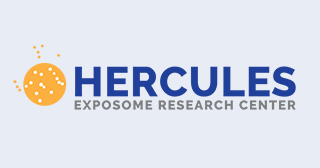
June 14, 2024
The NIEHS-funded HERCULES Center at Emory University was featured in a Rollins Magazine cover story for its role in advancing exposome research. The exposome is the sum of all environmental exposures and our body’s response to those exposures across the lifespan.
“It isn’t any one specific chemical, exposure, or social factor that leads to disease in individuals. It's really a combination of them," HERCULES Center Director, Carmen Marsit, Ph.D., told Rollings Magazine.
In the article, which is filled with eye catching illustrations, HERCULES Center members discussed how they use exposome approaches to unravel the ways environmental and social factors can interact to affect health.
- Donghai Liang, Ph.D., studies how prenatal exposure to ubiquitous pollutants, like air pollution and PFAS, affect child and maternal health. Liang uses cutting-edge exposure assessment and omics technologies to uncover the molecular pathways driving environmentally related health outcomes.
- Lauren McCullough, Ph.D., examines the roles of obesity and the social environment in cancer. She aims to improve cancer outcomes in underserved populations by bridging molecular and social epidemiology to identify targets for intervention.
- Amina Salamova, Ph.D., uses analytical chemistry and novel exposure assessment tools to investigate how semi-volatile organic compounds affect health with the goal of developing effective interventions to prevent or reduce these exposures.
- Douglas Walker, Ph.D., develops novel analytical and computational methods capable of detecting up to 100,000 chemical signals in a single biological sample. He’s using this approach to better understand the health effects from exposure to micro- and nanoplastics.
Read the Rollins Magazine article to learn more about how the HERCULES Center is advancing exposome science to improve health. You can also check out this two-part exposome podcast series from NIEHS featuring Walker and HERCULES Community Engagement Core leader, Melanie Pearson, Ph.D.
- The Exposome and Health (Part 1) – Walker shares how the field of exposomics is transforming environmental health research and creating opportunities to improve public health.


